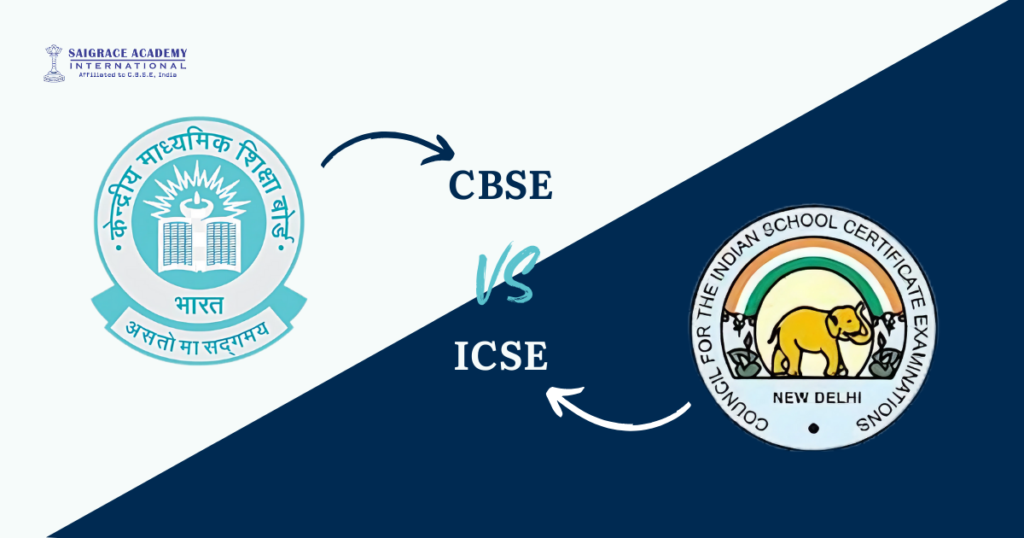
Choosing an educational board for your child is a decision where the entire route for their learning and development prospects may be defined. The most common dilemma Indian parents face is the CBSE vs ICSE syllabus.
Parents are eager to find out what advantages and disadvantages are between CBSE and ICSE, CBSE vs ICSE difficulty level, and which might suit as the best board for competitive exams in India.
To help you do that, this blog will give you a thorough comparison between the two with CBSE vs ICSE advantages and disadvantages.
So without wasting much of our time, let’s get started!
CBSE vs ICSE Syllabus
The syllabus structure of CBSE and ICSE caters to different academic needs.
CBSE (Central Board of Secondary Education):
The syllabus prescribed by CBSE is brief and precise in nature, with stress given to mathematics and science subjects. This is quite practical rendering it simple for the student to comprehend and apply the particulars taught.
ICSE (Indian Certificate of Secondary Education):
ICSE syllabus is too vast and covers a detailed structure wherein multiple subjects like humanities, arts, and languages along with science and maths are introduced. It focuses on the use of reasoning and hands-on learning.
CBSE vs ICSE Advantages and Disadvantages
Advantages of CBSE :
- Better scope for competitive exams in India.
- Encourages more skill-based learning.
- National-level common syllabus across the school.
- ICSE has many more subjects to offer.
Disadvantages of CBSE:
- Extracurricular subjects have less importance.
- More of a theoretical approach in some areas.
ICSE Advantages:
- Very vast and extensive syllabus.
- Better hold upon languages and communication.
- Promotes assessment based on a practical and holistic approach.
ICSE Disadvantages:
- It has an elaborate and more taxing course structure.
- Fewer schools that are associated with this board than CBSE.
Knowing the pros and cons of CBSE and ICSE will assist you in determining which board would best suit your child’s learning habits.
CBSE vs ICSE Difficulty Level
When evaluating the CBSE vs ICSE difficulty level, it is believed that the ICSE board is more difficult due to its extensive syllabus which is more granular.
CBSE Difficulty Level:
The syllabus of CBSE is simple enough and does not focus on many high concepts. It helps students especially in preparation for competitive exams in fundamental subjects without ambiguity.
ICSE Difficulty Level:
The syllabus of ICSE demands students to study subjects in more detail’ rather than prescribing only analytical orientation, which is good but for some students, it may appreciate their cerebral capabilities.
Best Board for Competitive Exams in India
When it comes to competitive exams in India, where parents tend to favor more such boards, CBSE is the best board in India for competitive exams.
- This is because CBSE is very much in sync with the preparation for entrance examinations like NEET, JEE, and UPSE – the syllabus eases the preparedness.
- As the ICSE students are good in logic as well as language, they are fit to take up such exams as CLAT and TOEFL.
Conclusion
Both CBSE and ICSE possess their significance and which one to opt for depends on how and what your child wants to achieve academically. Firstly, while CBSE is more beneficial to students preparing for any entrance exams, ICSE offers the advantage of language skills, creative development, and analytical ability of the student.
At Saigrace Academy International, our goal is to create an academic and social environment that supports the growth of every student in every area regardless of the board. Being a CBSE school, we maintain an equilibrium in imbibing knowledge that prepares the students for the obstacles that lie ahead. To know more about how we customize your child’s educational experience, visit us at Saigrace Academy International.

